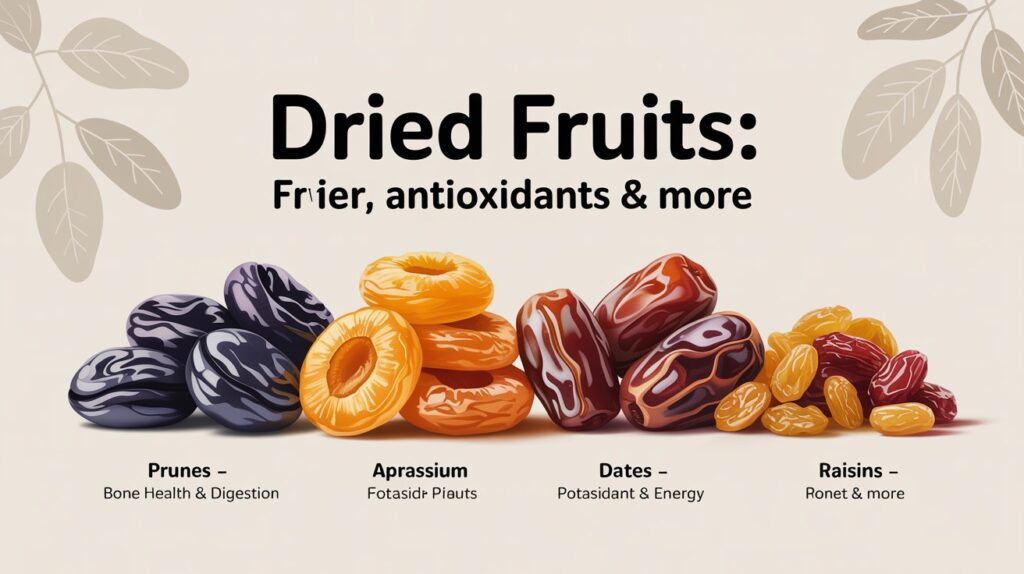
Introduction
Dried fruits — raisins, dates, prunes, dried apricots, figs, and others — are compact packages of flavor and nutrients. Because the water has been removed, their calories and nutrients are concentrated, which makes them energy-dense but also nutrient-rich. In the past decade a growing body of research from Asia, North America, and Europe has examined how regular, moderate consumption of dried fruits can support heart health, digestion, bone density, metabolic health, and even aging markers. This article explains the scientific evidence, practical uses, portion guidance, and cautions so you can add dried fruits to your diet in ways that maximize benefit and minimize risk. PMC+1
Key points
- Dried fruits are concentrated sources of fiber, potassium, vitamins, and polyphenol antioxidants. PMC
- Clinical trials and large observational studies show associations between dried fruit intake and improved bone health, better diet quality, and some cardiovascular benefits. PubMedPMC
- They can be included in a diabetic or weight-conscious diet when portioned and paired with protein or fat to slow absorption. PMCEatingWell
- Choose unsweetened, minimally processed dried fruits and control portions (typically 1 small handful = ~20–30 g). PMC

Why dried fruits are more than “just sugar”: nutrient profile and bioactives
Dried fruits retain many vitamins, minerals, fiber, and polyphenols — plant compounds with antioxidant and anti-inflammatory actions. Typical nutrient highlights (per 100 g, approximate ranges) include:
| Dried fruit | Calories (kcal) | Fiber (g) | Potassium (mg) | Notable bioactives |
|---|---|---|---|---|
| Raisins | ~300 | 3–4 | ~750 | Flavonoids, phenolics. My Food DataPMC |
| Dates (Medjool) | ~280–330 | 3–7 | ~600–700 | Phenolics, carotenoids. My Food DataPMC |
| Prunes (dried plums) | ~240 | 6–8 | ~700–730 | Sorbitol, neochlorogenic acid (prebiotic/antioxidant). Food StructPMC |
(Nutrient values vary by variety and processing method; authoritative databases such as the USDA FoodData Central provide detailed entries.) fdc.nal.usda.gov
Why that matters: the fiber and polyphenols interact with gut microbes, produce beneficial metabolites (short-chain fatty acids), and help blunt post-meal glucose spikes and lipids — mechanisms repeatedly discussed in recent reviews. PMC
Evidence from clinical trials and large studies
Cardiovascular and metabolic health
Observational and Mendelian-randomization analyses suggest higher dried fruit intake is associated with lower risks of stroke and some markers of cardiometabolic risk. A 2023 Mendelian-randomization study concluded that dried fruit intake may causally reduce ischemic stroke risk, particularly small-vessel stroke. While observational studies can be confounded, these genetic approaches strengthen the case for a protective link. PMC
For glycemic control, randomized trials are mixed: some trials of dates or raisins found no worsening of blood glucose when consumed in moderate amounts and sometimes improvements in post-meal glycemia when paired appropriately, while other trials show neutral effects. The take-home is that portion size and meal context matter. PMC+1

Digestive health and the gut microbiome
Dried fruits are rich in soluble and insoluble fiber plus polyphenols that act as prebiotics. Reviews summarizing human and mechanistic studies conclude that raisins, prunes, dates, and cranberries can positively modulate gut microbiota composition and support bowel regularity, with prunes long known clinically as a gently effective natural laxative. PMC+1
Bone health and menopause
High-quality randomized controlled trials now show promising bone benefits. The recent 12-month Prune Study (RCT) reported that daily prune consumption preserved tibial cortical bone density and estimated bone strength in postmenopausal women — a notable result because osteoporosis prevention is a major public-health goal for aging women. Related long-term studies are underway. PubMedPMC
Cancer, aging markers, and other outcomes
Narrative reviews and cohort analyses suggest dried fruits may contribute to lower cancer incidence and improved survival, likely via antioxidant and anti-inflammatory pathways, but evidence is still emerging and not yet conclusive. Interesting molecular data also link dried fruit intake to DNA methylation patterns associated with slower biological aging; these are early but provocative findings. MDPIScienceDirect

Practical recommendations — how to include dried fruits safely and effectively
- Portion control is essential. A small handful (about 20–30 g, or 1–2 tablespoons) is a reasonable serving for snacks or to add to cereals and salads. Because dried fruit is calorie-dense, large portions can add unexpected calories. PMC
- Pair with protein or healthy fats. Combining dried fruit with nuts, yogurt, or cheese slows carbohydrate absorption and helps glycemic control. This is practical advice supported by clinical nutrition guidance. EatingWell
- Choose unsweetened, minimally processed varieties. Avoid added-sugar or candy-coated dried fruits. Check labels for preservatives (sulfites) if you are sensitive. PMC
- Use specific dried fruits for specific goals.

Cautions and populations to monitor
- Blood sugar and diabetes: Dried fruits contain concentrated sugars. People with diabetes can include them in meal plans but should monitor portions and test blood glucose response. Trials generally show no large harm when consumed in moderate amounts, but individual responses vary. PMCEatingWell
- Calories and weight control: Because they are calorie-dense, excessive consumption can contribute to energy surplus. Track portions if you are monitoring weight. PMC
- Added sugars and sulfur dioxide: Some commercial dried fruits contain added sweeteners or sulfites. Sulfites can trigger reactions in sensitive individuals (e.g., asthma). Choose “no sugar added” and “unsulfured” labels when needed. PMC
Short table: Evidence strength for common benefits
| Benefit | Evidence strength (2020–2024) | Representative studies |
|---|---|---|
| Improved diet quality (more fiber/minerals) | Moderate (cohort & dietary analyses) | Sullivan et al., 2020 (NHANES analyses). PMC |
| Reduced ischemic stroke risk (MR analysis) | Moderate — genetic analysis suggests causality | Zeng et al., 2023. PMC |
| Bone health (postmenopausal) | Growing — RCT evidence | Prune Study / Koltun et al., 2024. PubMedPMC |
| Glycemic control | Mixed; neutral to small effects | Butler et al., 2022 (dates), assorted trials. PMC |
| Gut microbiota modulation | Limited but promising | Alasalvar et al., 2023 review. PMC |
Recent notable studies and contributors (examples by region)
- Asia: Mendelian-randomization and population genetic studies linking dried fruit intake to lower stroke risk and favorable aging markers (e.g., Zeng et al., 2023). PMCScienceDirect
- North America: Randomized trials of prunes and ongoing large clinical trials focusing on bone health and metabolic outcomes (e.g., the U.S.–based Prune Study and associated RCTs). PMCPubMed
- Europe: Comprehensive reviews and mechanistic work on dried fruit bioactives, gut microbiota, and nutrition policy discussions that place dried fruits as acceptable alternatives to fresh fruit in dietary guidelines. PMCOrganisation mondiale de la santé

Conclusion — who benefits and how to use dried fruits wisely
Dried fruits are a convenient, shelf-stable, nutrient-dense way to boost dietary fiber, potassium, micronutrients, and beneficial plant compounds. The evidence from reviews, cohort studies, Mendelian-randomization analyses, and randomized trials points to real benefits — improved diet quality, gut health, potential stroke risk reduction, and meaningful bone-health effects for certain dried fruits like prunes. However, because they are calorie-dense and contain concentrated sugars, portion control and food pairing are essential, especially for people with diabetes or those watching energy intake.
If you want a simple approach to add dried fruit to your diet: aim for a small handful (20–30 g) per serving, combine with nuts or yogurt, choose unsweetened varieties, and treat them as a high-value ingredient rather than an unlimited snack. When used thoughtfully, dried fruits are a true nutrient-dense superfood that can support longevity, metabolic health, and daily wellbeing. PMC+1PubMed
Selected references (for further reading)
- Alasalvar, C., et al. Dried Fruits: Bioactives, Effects on Gut Microbiota, and Health (review). 2023. PMC
- Zeng, Y., et al. Causal associations between dried fruit intake and … (Mendelian randomization). 2023. PMC
- Bolling, B. W., et al. Dried Fruits, Nuts, and Cancer Risk and Survival: A Review. 2023. MDPI
- Koltun, K. J., et al. Prunes preserve cortical density… — The Prune Study. Osteoporosis Int., 2024. PubMedPMC
- Butler, A. E., et al. Effect of Date Fruit Consumption on Glycemic Control. 2022. PMC
- USDA FoodData Central — nutrient composition database. fdc.nal.usda.gov
- World Health Organization — Healthy diet fact sheet. Organisation mondiale de la santé





